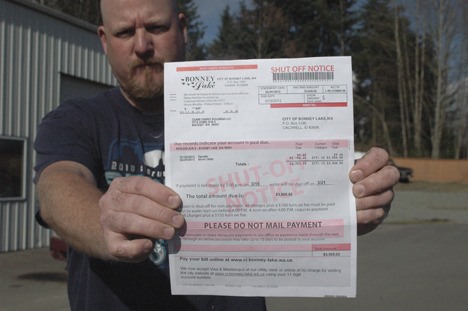Bonney Lake land owner Joel Clark is self-described as furious over a change to his stormwater billing that saw his monthly rate jump from $41 to a whooping $771 on a single five-acre parcel in Eastown.
The city charges for stormwater based on the amount of impermeable surface on a given property. Clark’s bill increased in January following a review from the city that determined his land to have much more impervious surface than originally noted.
Located at the corner of state Route 410 and 234th Avenue East, Clark’s property is at the far end of the Eastown city limit. It includes one building, and is mostly covered in gravel, though there are several truck trailers parked throughout his land.
“They’re saying the gravel is impervious,” Clark said recently, shaking his head.
On top of that, Clark’s property sits lower than SR 410 and therefore he does not even connect to the city’s stormwater treatment system.
But according to Public Works Director Dan Grigsby, the gravel, which he said is more like road base than what you would find in a fish tank, is considered an impervious surface in the Pierce County Stormwater manual, which the city adopted as part of its own code.
“Gravel is still impervious,” Grigsby said this week. “You have a rain and water is going to run off that surface.
“It’s not going to sink into the ground,” he said.
Grigsby said the city is required by law to manage stormwater and to determine a fair way for all property owners to pay into the system.
In Bonney Lake, the city uses an equivalency service unit (ESU), that Grigsby said is about 2,400- to 2,700-square-feet of impervious surface, an amount he said is about average for a single family home, including driveway.
Each unit is charged $14 per month in stormwater fees.
Grigsby said the first determination on Clark’s property came in 2005. Grigsby said the city paid a contractor to look at sites around the city and determine the amount of impervious surface, but Grigsby said they did not think to tell the contractor that gravel was impervious.
Clark’s property was determined to have about 2 ESUs, with the only impervious surface being the roof of a building on the property.
But in 2010, the city began using its geographical information services aerial photographs to do look at several sites around the city, including Clark’s. From the air, Grigsby said it was obvious that Clark had laid gravel throughout his property. The new calculations returned a rate based on 55 ESUs, resulting in the jump of more than $700.
“We apply this to everyone. We’re not picking on him,” Grigsby said. “It’s the same rate we apply to every other customer.”
Grigsby also said that despite Clark not connecting to the system, law requires him to pay into the utility. He said Walmart also treats all of their stormwater on their property, but is required to pay into the city system at a rate reflecting their impervious surfaces. Grigsby said the city reviewed 161 properties and of those, 116 saw reductions in their rates. Of the 45 properties who saw increases, Grigsby said 26 of those were for more than $50 per month.
However, he admits the city should have looked at the big increases and warned property owners about the coming cost hike.
Grigsby said Clark and the Swiss Park saw the largest increases and said from the air it was obvious that both properties had been developed for commercial purposes, with additional gravel being added to both sites, creating large, impervious surfaces.
Clark appealed the city’s determination, but the appeal was denied this week. Grigsby said during an appeal, he can only look at if the laws were applied properly and if there was a measurement error. In both cases, Grigsby said the city acted properly.
The appeal also alerted the city to increased gravel on three other parcels owned by Clark, which were not previously billed because those parcels did not receive utility bills. They will begin to get them now.
Grigsby said to reduce his cost, Clark must either reduce the amount of impervious surface or he can add a detention pond on the property, which could make him eligible for a 30 percent reduction, but otherwise, there was little the city could do.
“We’re trying to work with him, but our hands are really tied,” Grigsby said.
According to city code, Clark has a final appeal to the mayor, who said he sympathizes with Clark’s situation, but is not sure what he can do.
“I feel for Joel. It’s a tough situation,” Mayor Neil Johnson said. “If the appeal comes to me, I’ll review it and see what I can do under my authority.”
Clark is limited in developing his property because of a lack of sewer access, as well as large Fennel Creek buffers (determined by the state) that run through the heart of his land. He said he had no plans to pay the increased amount and said the restrictions mean that he can’t even do anything with his property to raise the money to pay the more than $30,000 in property taxes or the increased utility charges.
“Bonney Lake will bankrupt us before any new development is done on the Plateau,” he said.



